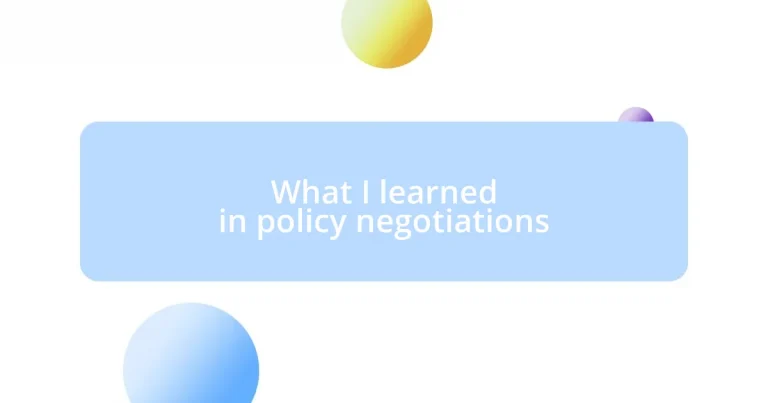Key takeaways:
- Emotional intelligence and relationship-building are key in transforming conflict into collaboration during negotiations.
- Effective negotiation requires strong communication, active listening, and adaptability to ensure understanding and flexibility.
- Clarity of goals and creative problem-solving enhance the likelihood of successful negotiation outcomes.
- Empathy and patience can break down barriers, fostering an environment conducive to innovative solutions and collaboration.
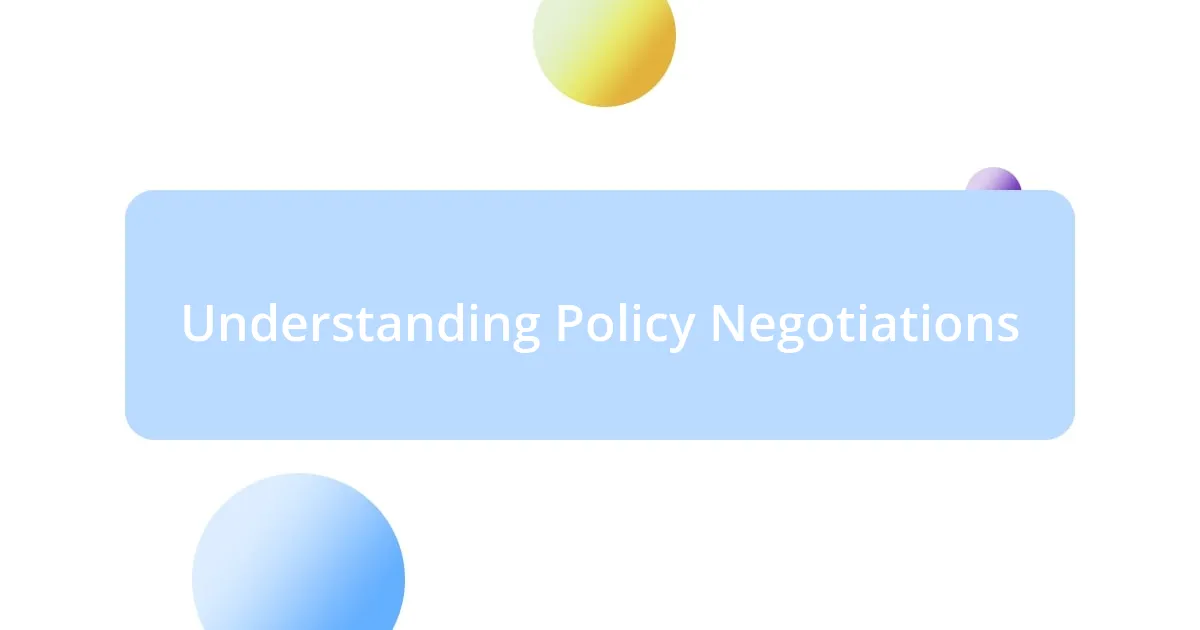
Understanding Policy Negotiations
Policy negotiations often feel like an intricate dance, where each step requires careful consideration and timing. I remember a particular negotiation where emotions ran high; it reminded me how crucial emotional intelligence is in understanding the needs and motivations of all parties involved. Have you ever found yourself in a conversation where you sensed that the “real” issues were lurking beneath the surface? I often reflect on how many misunderstandings could be avoided if we just took a moment to grasp each other’s perspectives.
It’s fascinating how building relationships can make or break a negotiation. I vividly recall a negotiation that started as a conflict but transformed into a collaborative effort thanks to a few candid conversations over coffee. I genuinely believe that fostering trust often leads to more innovative solutions; it’s about creating a space where everyone feels comfortable contributing their ideas. Isn’t it incredible how a simple connection can completely change the dynamics of a discussion?
In my experience, effective policy negotiation involves more than just presenting facts; it’s about storytelling. I once had a colleague who could weave personal anecdotes into discussions, which not only humanized our arguments but also made them more relatable. This experience highlighted for me how sharing personal insight can bridge gaps and turn opponents into allies. Wouldn’t you agree that the heart of negotiation lies in connecting on a human level?
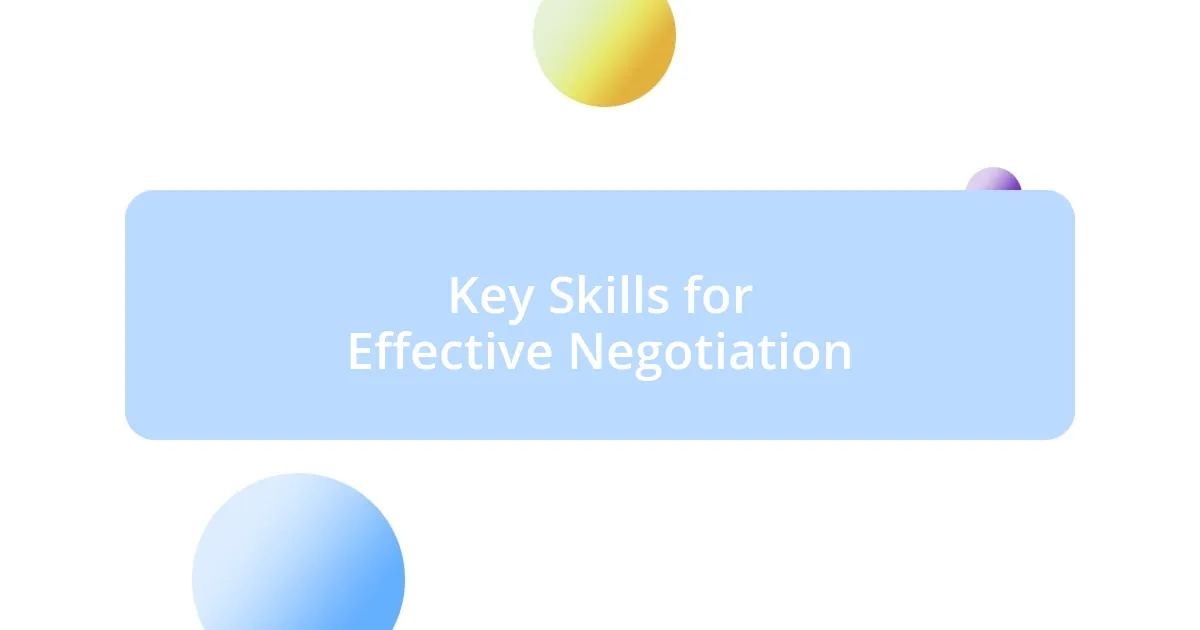
Key Skills for Effective Negotiation
When it comes to effective negotiation, communication skills stand out as a cornerstone. I recall a situation where I noticed how different communication styles affected the flow of discussions. Some team members were straightforward, while others preferred a more nuanced approach—realizing this taught me that adapting my communication style to fit the audience can enhance understanding and prevent conflicts. Have you ever tried adjusting how you convey your thoughts depending on who you’re speaking with? That extra effort often makes all the difference.
Another essential skill is active listening. In one particularly tense negotiation, I found myself genuinely listening—not just hearing—what my counterpart expressed. This experience opened up opportunities for compromise I hadn’t considered before. I believe it’s crucial to let others know they are heard; sometimes, the mere act of listening can defuse tensions and create an atmosphere ripe for collaboration. It’s amazing how many solutions can emerge when we prioritize comprehension over winning.
Lastly, adaptability is vital during negotiations. I learned this firsthand when a planned agenda went off the rails due to unforeseen issues. Instead of panicking, I pivoted, shifting the conversation toward the emerging points of concern. This adaptability led to a productive discussion that addressed the new challenges head-on and ultimately resulted in more satisfying outcomes for all involved. Have you ever felt that flexibility turned a potentially frustrating situation into a fruitful one? It certainly has shaped my approach to negotiations.
| Key Skills | Description |
|---|---|
| Communication Skills | Effectively sharing ideas and adapting to the audience’s style enhances understanding. |
| Active Listening | Being fully present and engaged allows for deeper understanding and collaboration. |
| Adaptability | Being flexible during negotiations can lead to unexpected solutions and satisfaction. |
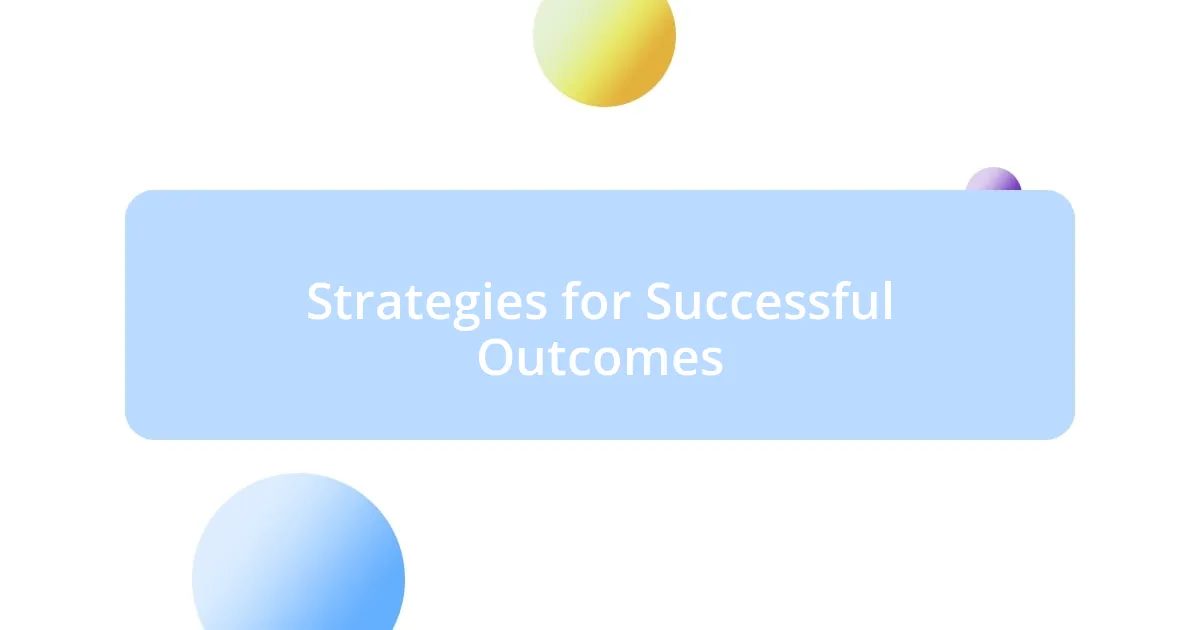
Strategies for Successful Outcomes
To achieve successful outcomes in policy negotiations, clarity of goals is paramount. I remember a time early in my career when I entered a negotiation without fully understanding my objectives. The result was a confusing tug-of-war that left everyone frustrated and unfulfilled. Now, I always make it a priority to outline clear, measurable goals before the discussions begin. This clarity not only guides my contributions but also helps the other parties engage constructively. Wouldn’t a well-defined aim make negotiations more effective?
Another winning strategy involves exploring creative solutions. During one particularly challenging negotiation, instead of sticking rigidly to our original proposals, I suggested brainstorming ideas together. This collaborative approach sparked unexpected yet valuable alternatives that satisfied everyone’s interests. It taught me that staying open to out-of-the-box thinking can transform adversarial discussions into opportunities for cooperation. In my experience, fostering an environment where creativity thrives can lead to breakthroughs. Here are some strategies that I’ve found effective in my negotiations:
- Clarify Goals: Clearly define what you want to achieve before entering the negotiation.
- Engage in Creative Problem Solving: Encourage brainstorming to uncover innovative solutions.
- Maintain a Positive Atmosphere: Foster a respectful and open environment to facilitate collaboration.
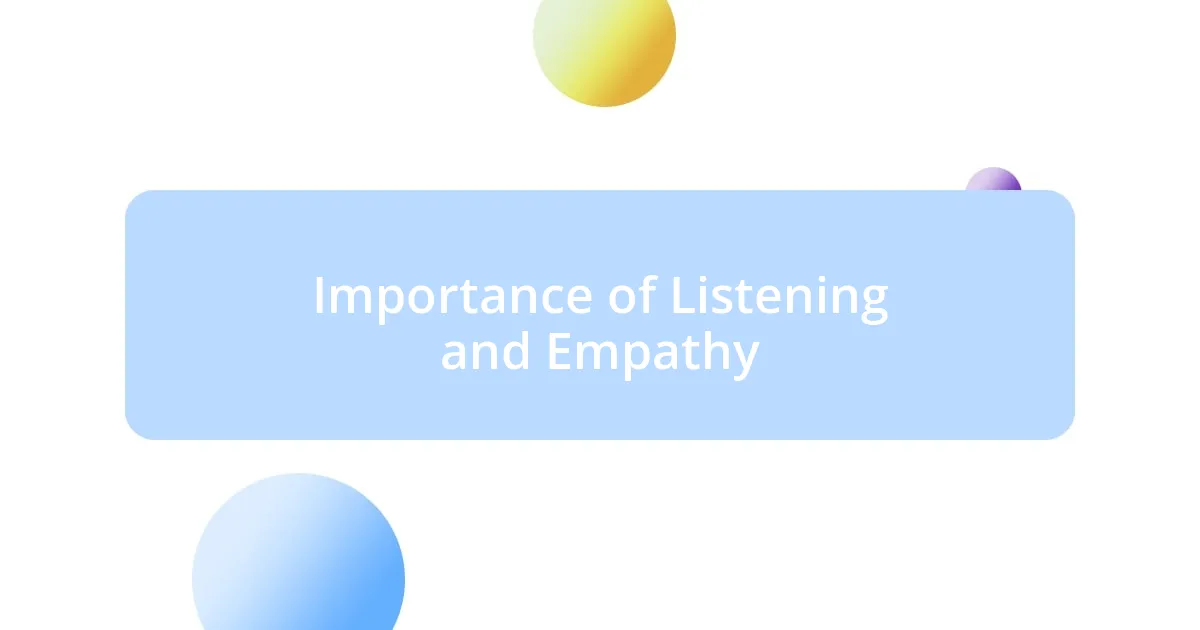
Importance of Listening and Empathy
Listening and empathy are often the unsung heroes of successful negotiations. I remember a time where a colleague launched into a passionate speech about their concerns, and rather than interrupting or brainstorming solutions, I simply let them talk. That simple act of giving space allowed the tension in the room to dissipate. Have you ever realized how much can change when we show someone we genuinely care about their perspective?
Empathy plays a crucial role too. During one negotiation, I sensed that my counterpart was feeling overwhelmed by the stakes involved. Instead of pushing my agenda, I took a moment to acknowledge their feelings and reassure them that we were all in this together. This acknowledgment transformed our dynamic, turning what felt like a battle into a collaborative effort. Isn’t it fascinating how vulnerability can pave the way for connection and understanding?
Active listening isn’t just a technique; it’s an art form that fosters genuine dialogue. During another instance, I experienced a breakthrough when I asked open-ended questions that invited deeper reflection from my fellow negotiators. The responses were enlightening and led us to a solution that felt like a true win-win. In my experience, when you listen with intent and compassion, the negotiation shifts from merely exchanging demands to forging meaningful agreements. How often do we miss out on these opportunities simply because we’re too focused on getting our points across?
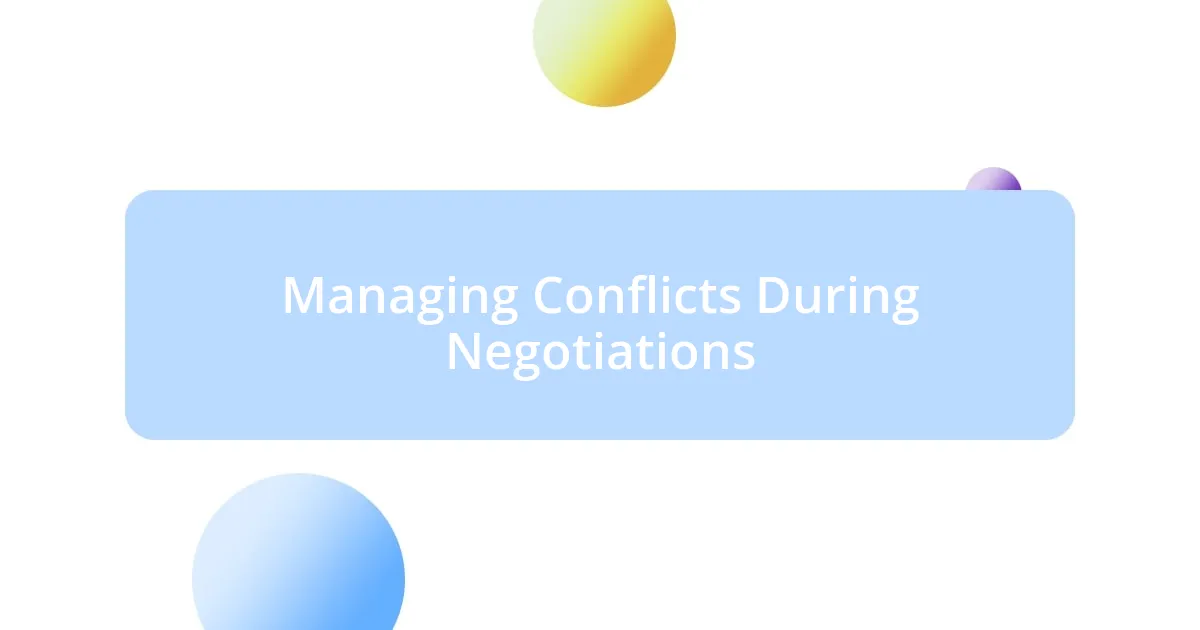
Managing Conflicts During Negotiations
Managing conflicts during negotiations is an intricate dance that requires both skill and sensitivity. I recall a tense negotiation where a key difference in priorities threatened to derail our progress. Instead of escalating the conflict, I suggested we take a break and revisit our individual motivations. This simple step allowed everyone to reflect, and when we reconvened, we approached the situation with renewed understanding and reduced tensions. Have you ever noticed how stepping back can often illuminate a path forward?
Another time, I encountered a critical disagreement over resource allocation. Rather than stand firm, I initiated a dialogue focused on the underlying interests of all parties involved. By encouraging everyone to voice their concerns, we transformed the conflict into a discovery of common ground. It was remarkable how articulating our fears shifted the atmosphere from confrontational to collaborative. Don’t you find it enlightening how revealing your vulnerabilities can foster connections?
I’ve also learned the value of utilizing neutral language during disputes. In a particularly contentious meeting, I consciously avoided blaming language and instead framed disagreements as shared challenges. This shift helped reframing hostility into a problem-solving mindset, prompting parties to engage more constructively. Every time I’ve tried this approach, I’ve seen the environment evolve from tension to cooperative resolution. Why is it that a few careful word choices can completely change the course of a negotiation?
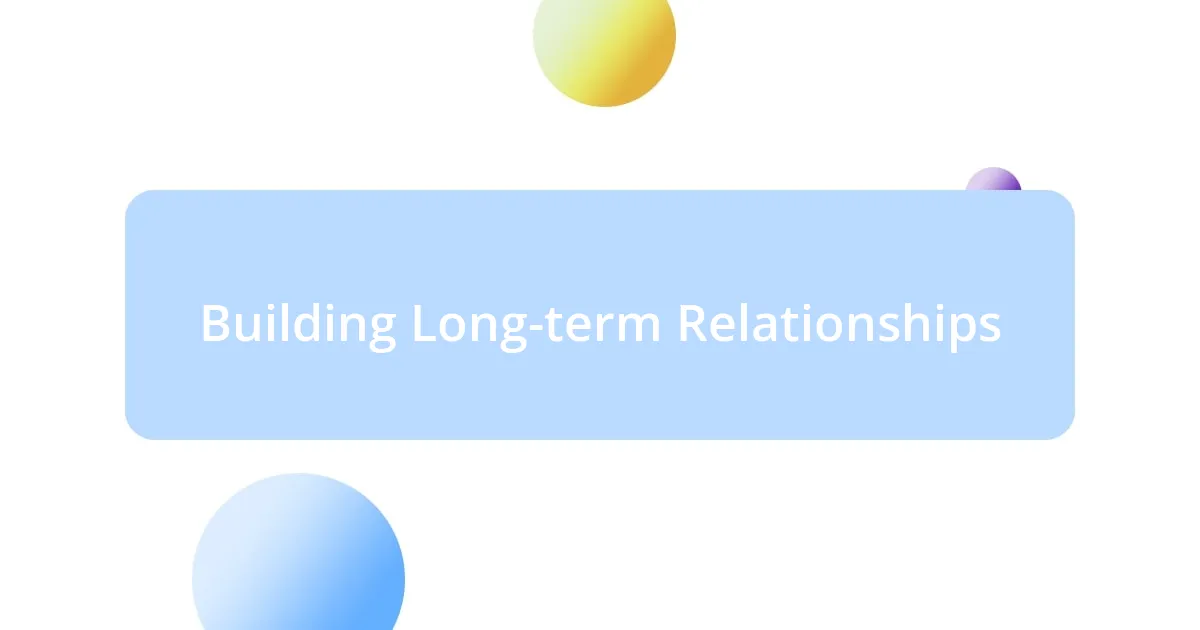
Building Long-term Relationships
Building long-term relationships in negotiations is all about nurturing trust over time. I recall a situation where I unexpectedly ran into a former counterpart months after a heated negotiation. Instead of evading the encounter, I greeted them warmly, inquiring about their current projects. This genuine interest opened doors to future collaborations we wouldn’t have considered if we hadn’t maintained a friendly rapport. Isn’t it interesting how a simple conversation can keep the lines of communication open for years?
Moreover, I’ve learned that consistency in communication is vital for strengthening these relationships. In one instance, after concluding a negotiation, I made it a point to follow up regularly with my colleagues, checking in on their progress and challenges. This practice not only reaffirmed my commitment to our agreement but also demonstrated that I valued our partnership beyond just the deal. Have you ever thought about how a little consistent effort can make a significant difference in how others perceive your intentions?
Finally, the importance of celebrating small wins cannot be overstated. During another negotiation, I initiated a small recognition event to highlight the successes we’ve achieved together. It fostered a sense of camaraderie and showed everyone that our collaboration was appreciated. I truly believe that celebrating milestones, no matter how minor, fortifies relationships in a way that creates lasting bonds. How often do we take moments to acknowledge the journey we are on with our partners?
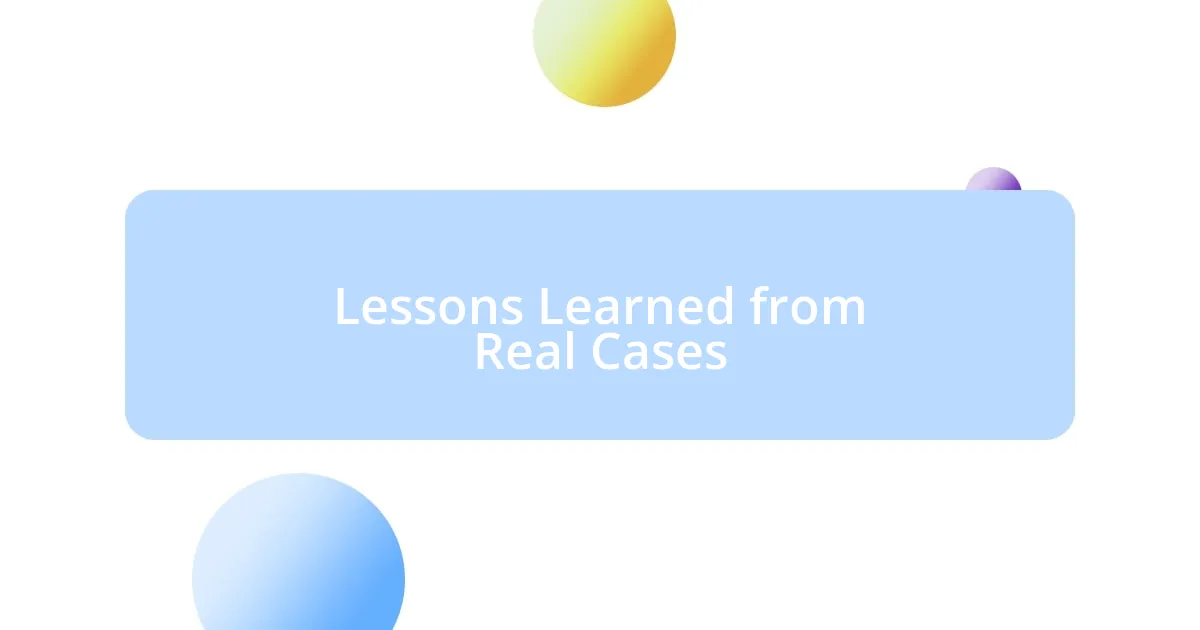
Lessons Learned from Real Cases
One of the most telling lessons I encountered in policy negotiations came during a local community project. Initial discussions were rife with disagreement because everyone was focused on their own agendas. I decided to share a story from my own experience where we had to prioritize community needs over individual wants. This articulation of personal stakes made the group reconsider their positions and pivot towards a more community-centric approach. Have you ever found that sharing your own experiences can break down barriers?
In another instance, I witnessed the transformative power of patience. During a complex negotiation regarding land use, parties were fixated on immediate outcomes, which clouded their vision. I suggested taking a moment for everyone to reflect and write down their long-term goals related to the project. When we reconvened, the conversation shifted from short-term gains to a more holistic view, unveiling opportunities we hadn’t previously considered. Doesn’t it amaze you how a little patience can lead to a deeper understanding?
A particularly defining moment for me involved the significance of empathy. During negotiations with multiple stakeholders for a public health initiative, I took the time to understand the emotional landscape each party was navigating. I openly acknowledged their concerns, which led to a breakthrough moment when everyone felt seen and heard. Suddenly, tensions dissipated, and we could brainstorm innovative solutions collaboratively. Isn’t it fascinating how empathy can catalyze productive collaboration?












